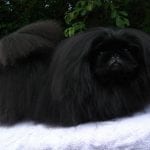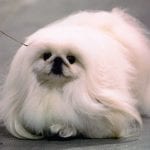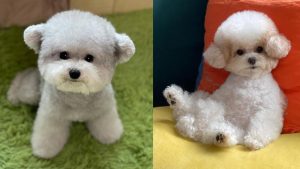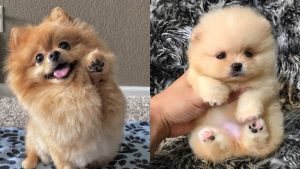Pekingese Dogs are known its small size and pear-shaped body along with the lighter hindquarters and heavy forequarters. This dog is also a little longer than it is tall, which makes it the perfect compact breed.
The breed is known for its lion-like image due to the dog’s boldness, courage, and self-esteem.
The dog has a dignified and unhurried gait with a bit of a roll, which is the result of its more massive and more full forequarters. It has a thicker undercoat and a long, straight but coarse outer coat that tends to stand off.
Often, the dog’s coat creates a mane around its shoulders. It is the lion-like characteristics of the Pekingese dog breed that earns its lion-like appearance, along with its bold character.
Temperament of Pekingese Dogs
The most notable trait of the Pekingese concerning its temperament is it isn’t timid. As said before, it is a courageous dog that although will not start a fight will not back down either.
Besides this, Pekingese dogs are bit aloof when around strangers, but this trait is not prevalent to the whole breed. Many Pekingese dogs are independent, loving, and outgoing, but not overly demonstrative.
Of its different characteristics, the Pekingese dog’s stubbornness is famous. While the dog is playful when it is around a family member, sometimes it is not as playful or athletic to satisfy the children’s playmate needs.
Pekingese dogs are not ideal for sloppy hard play, or it will likely get injured. The dog is also known not to tolerate when handled roughly by children.
Pekingese dogs make excellent watchdogs but may prove to be difficult to housebreak. If you overfeed your Pekingese, it can quickly end up overweight.
A critical aspect of the dog’s temperament that you have to consider is its tendency to develop Small Dog Syndrome. If you let this compact dog run around the house as if he is the pack leader, they can develop some bad behaviors.
It can show some negative behaviors including being wary of a stranger, prone growling, obsessive barking, biting, and snapping, as well as show signs of separation anxiety, being obstinate, jealous, and self-willed.
Stopping your Pekingese dog from inhabiting these traits involve giving it strict rules to follow and limiting what they can and cannot do.
Related Articles –
- 16 Amazing Things About Morkie Dog Breed
- Pomeranian Husky Mix – 12 Facts You Should Know About Pomsky
- Aussiedoodle – 12 Things You Need to Know About
- Bernedoodle Dog Facts and Information



Along with giving your dog a regular walk out, you can relieve the dog’s energy, both mental and physical so that it will have a more appealing temperament. The critical thing when living with a Pekingese dog is to show it that you are a strong, able leader of the pack. When you do, you can be sure it acts a beautiful little lap dog.
How long do Pekingese live ?
Healthy Pekingese dogs have a lifespan of around 10 to 15 years. They are great dogs for apartment life, being relatively inactive and do well even when you don’t have a yard.
However, Pekingese dogs do need a daily walk. Its exercise needs can be taken care of by play, so you don’t have to worry about that. Exercise is essential to ensure your dog will not display behavior problems and that it stays healthy.
At what age is a Pekingese full grown?
As you know already, the Pekingese dogs are small, and thus they don’t appeal that well for people who like large dogs. This breed belongs to the toy group, which usually don’t go over 14 pounds in weight.

A fully grown Pekingese is around 6 to 9 inches in height at around the shoulder for both male and female. If your pet gets to near this size, it is likely through with all the growing it can get.
Tiny Pekingese dogs are often called “sleeve” Pekingese. Dogs of this breed that doesn’t weight over 6 pounds can earn the nickname. On the other hand, if your pet is only within the 6 to 8 pounds bracket, then it can earn the nickname “mini” Pekingese. With mature Pekingese usually still so small, they are great for small dwellings such as those in the cities.
Does a Pekingese Dog Shed?
One of the bad things about this dog breed is it packs massive shedding. It can shed a lot, and you are likely going to find hair and fur all over your house, on your clothing, and furnishings.
Because of this and the fact that its coat can quickly become a matted mess, Pekingese dogs need constant combing and brushing. It also needs occasional trimming around the hind end for sanitary purposes.
Is a Pekingese Dog a Good Family Dog?
The Pekingese dog breed is a great family dog for its incredible traits of confidence, dignity, and independence. It is calm and quiet when indoors, usually content with just lying on the sofa most of the time.
Still, you can be surprised by its sudden bursts of playfulness and some dogs in this breed are even more playful.
Another unusual trait of this breed is how it is loyal to its owner without acting clingy. Generally, it is polite to other animals and strangers.
This dog breed is great for homes where there are only adults, particularly senior citizens. It isn’t ideal for families with children because they aren’t that happy with rough handling or the mischief as expected from children.
Are Pekingese Dogs Aggressive?
Usually, Pekingese dogs are calm and quiet. However, they are also known for being stubborn and sometimes, aggressive. They can be jealous and possessive, which manifests in bouts of aggression towards other dogs or other people.
At some time, this dog breed can be tolerant of other dogs but with those that have been present for a time.
Because of the unpredictable tendencies of Pekingese dogs, they aren’t suited to households with children. Most children will usually think of this dog breed as a toy or a doll and not handle them gently and cause them harm.
Pekingese dogs are not great at adjusting well to a house where there are small children even if it learns at least basic obedience.
Are Pekingese Dogs Hypoallergenic?
As mentioned before, Pekingese dogs are a heavy shedder. Additionally, these dogs are not hypoallergenic. Therefore, they are not recommended for people with allergies to dogs.
Many believe that Pekingese is related to Shih Tzu, thus thinking it is hypoallergenic, but that is not the case. Pekingese dogs can cause an allergic reaction characterized by red, itchy eyes, coughing, running nose, sneezing, and wheezing.
Are Pekingese Dogs Smart?
Whether Pekingese dogs are smart or not, it is undeniable that this dog breed is hard to train. It can be challenging to house train due to its dominating and independent attitude. The dog breed is usually attributed to having low intelligence, but many say they are smart.
The belief that Pekingese dogs are slow is because they are stubborn. However, the stubbornness is due to the dog’s imperial heritage, which manifests in how the dog carries itself with dignity and pride. This dog breed has much intelligence, is brave with a sense of humor, and does fear anything.
With the dog’s almost human-like intelligence, they are easy to get along with as long as you give them enough attention.
Do Pekingese Dogs Bark a Lot?
Pekingese dogs are watchdogs, and so you can expect it to have a good bark. However, rest assured that it usually only barks when it has something to bark at, which means it likely stays quiet most of the time.
This dog breed is not yappy and noisy, but when they see someone or something at the door, you can be sure that they will raise the alert.
However, once it is done and no longer has any reason to shout, they usually stop barking. As such, you can expect that Pekingese dogs do not bark just for the sake of barking.
They will mostly sit on your couch sitting idly by, quiet for hours. For this reason, they make a good watch dog when living in apartments or any small dwellings.
Pekingese Dogs Health Issues
Pekingese dogs tend to have many health problems. They can easily catch colds and have difficult births. The breed is also prone to dislocated kneecaps and herniated disks. Moreover, they often suffer from trichiasis or lashes that grow inwards to the eyeballs. Furthermore, Pekingese dogs tend to have heart problems and breathing problems often.
How Much Does a Pekingese Dog Cost?
On the average, a Pekingese puppy can cost around $500 to $750. However, dogs with AKC bloodline will be priced higher possibly at around $1000 to $2500. Several factors affect the price of a Pekinese dog such as the breeder, the age of the dog, geographical location of where you bought it, the quality of the dog, and more.
The total cost of a Pekingese dog usually includes a health guarantee, health check-up, vaccinations, etc. The inclusion of a microchip and neutering can also add to the cost, not to mention several other extra costs. That being the case, the average amount of pay for a Pekingese dog is usually around $700 to $1000 every year.
Related Articles –
- Amazing Things About Corgi Husky Mix – Horgi Facts
- Teacup Maltipoo – 10 Things You Should Know
- Maltese Shih Tzu – Surprising Things About Malshi
- Sheepadoodle – Everything You Should Know About






Everything you said about the pekingnese is how my baby is except she thinks she is a diva haha love your artículo thanks